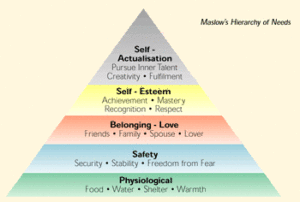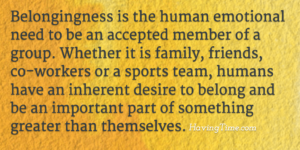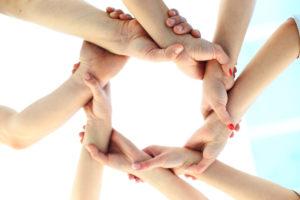
by Dr.Moira Borg MD Gestalt Psychotherapist
When physicist Isaac Newton was exploring the effects of forces on objects way back in 1687 he discovered that for every action applied to an object there was an equal and opposite reaction (third law of motion). Forces and motion are not phenomena which occur only to inert objects. In fact in psychology and sociology one of the basic laws, namely Kurt Lewin’s Field Theory (1934), extrapolates from Newton’s law and describes the mutual forces or interactions between individuals and their environment (field).
One of the major effects that the human being has had on its environment especially during the last two centuries is progress. This has come from the demands or needs that come with still being at the helm of the animal kingdom in the 21st century. Maslow (1943, 1954) aptl y depicts the hierarchy of the needs that every individual in a developed society expects starting from the basic needs for survival namely food, rest and safety and extending to human relationships, self-esteem and self-actualisation.
y depicts the hierarchy of the needs that every individual in a developed society expects starting from the basic needs for survival namely food, rest and safety and extending to human relationships, self-esteem and self-actualisation.
Belonging, that is being the property of or a member or part of, is the first need that every human being expresses once his basic survival needs are satisfied. The World Health Organisation (WHO) also describes social well-being as one of the essential prerequisites for health. Unfortunately despite the progress and subsequent amelioration in our standard of living including a marked improvement in connectiveness, loneliness and alienation have become ‘the opposite reaction’ to such progress globally, crossing boundaries, across sectors, groups, and disciplines and affecting all of us directly or indirectly.
Data from different parts of the world confirm this dire reality. In poor countries most inhabitants want to move in richer countries in the hope for a better living. There are sixty ongoing unresolved wars worldwide with no hint of resolution in sight which further compounds the issue of migration and poverty even in previously developed countries as happened in Arab countries where wars have torn through their hope for a Spring and turned it into an icy relentless winter, their citizens into homeless, lost migrants and their once thriving economies literally to dust.
Being well endowed does not spare richer countries from this scourge. In the US 35 percent of adults older than 45 reported chronic loneliness, as opposed to 20 percent of a similar group only a decade earlier. Roughly 20 percent of Americans — about 60 million people — were found to be unhappy with their lives because of loneliness while 20-22% kids of various age groups go hungry every night. Despite being a union, Europe is also struggling with a crisis in the construction of its identity including the aspects that underlie its ‘peace and prosperity’ which are further exacerbated by underlying tensions among member states.
Belonging in our century thus spans from not actually having a country, a home or any basic form of security including food and drink to having it all and yet still be unseen, unacknowledged and uncared for by people around us, at times even by those ‘near and dear’. This is the paradox, the action-reaction of the 21 st century full of promise and threats.
“It is a new, complex and unexpected situation — one that has taken many of us by surprise. We are living in an isolation that would have been unimaginable to our ancestors, and yet we have never been more accessible……. Our traditional safety nets are not set up to respond. It is not easily pigeon holed or categorized. It is ambiguous. We are not even sure how to define it (we feel it as much as anything), let alone solve it.”
Al Etmanski, author and social entrepreneur
This lack of clarity and subsequent lack of preparedness is most probably what makes this phenomenon even more fearsome putting the human race in a collective aura of doom and helplessness. Unlike the palpability of the devastation of post-World War II, which was easily counteracted when US Secretary of State George C. Marshall rallied his country to “do whatever it is able to do to assist in the return of normal economic health in the world,…….. against hunger, poverty, desperation, and chaos.. …” (June 5,1947), loneliness in the 21st century seems to be uncontainable like a big drop of ink in a basin full of clear water.
Let us hope that this phenomenon will not turn out to be the existential pillar of salt or submarine iceberg that will threaten our very existence but a spur for us to use our sophisticated means of connectivity to our support not detriment. Belonging is after all an inherent instinct that starts before we are born and is enhanced through the quality of our relationships. Relationship is thus the antidote to loneliness – it is that simple.

